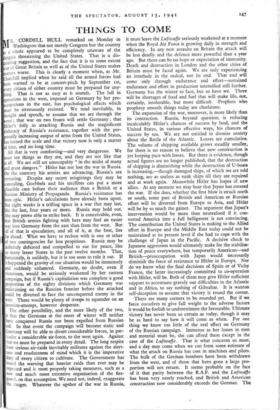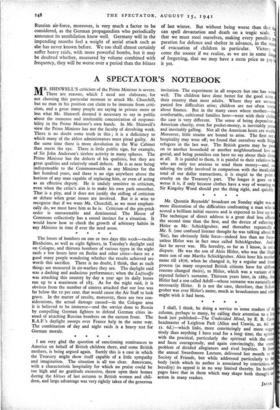THINGS TO COME
R. CORDELL HULL remarked on Monday in Washington that not merely Congress but the country a whole appeared to be completely unaware of the angers threatening the United States. That is a dis- uieting suggestion, and the fact that it is to some extent ue of Great Britain as well as of the United States makes atters worse. This is clearly a moment when, as Mr. hurchill implied when he said all the armed forces had een warned to be at concert-pitch by September ist, 'cry citizen of either country must be prepared for any- hog. That is not as easy as it sounds. The lull in perations in the west, imposed on Germany by her pre- cupations in the east, has psychological effects which ust be strenuously resisted. We tend inevitably, in Nought and speech, to assume that we are through the vorst ; that war on two fronts will settle Germany ; that itler's folly in attacking Russia and the magnificent bduracy of Russia's resistance, together with the per- etually increasing output of arms from the United States, as turned the scale and that victory now is only a matter time, and no long time.
All that is very comforting—and very dangerous. We ust see things as they are, and they are not like that t all. We are still set unescapably " in the midst of many d great dangers." Hitler has not lost the war in Russia. n the contrary his armies are advancing, Russia's are etreating. Despite any secret misgivings they may be oncealing, Goebbels and his satellites can put a more lausible case before their audience than a British or a ussian Ministry of Propaganda. Russia's resistance has een epic. Hitler's calculations have already been upset. But eight weeks is a trifling space in a war that may last, ke the last, four years or more. Russia may hold out. She may prove able to strike back. It is conceivable, even, at British armies fighting with hers may find an easier way into Germany from the east than from the west. But all of that is speculation, and all of it, at the best, lies far ahead. What we have to reckon with is one or other of two contingencies far less propitious. Russia may be definitely defeated and compelled to sue for peace, like so many lesser States in the past twelve months. That, ortunately, is unlikely, but it is too soon to rule it out. If it happened the gravity of our situation would be immensely and suddenly enhanced. Germany, no doubt, even if victorious, would be seriously weakened by her eastern campaign, but if Russia's capitulation was complete a good proportion of the eighty divisions which Germany was maintaining on the Russian frontier before she attacked could be diverted to face the unconquered enemy in the west. There would be plenty of troops to squander on an invasion-attempt, however desperate.
The other possibility, and the more likely of the two, Is that the Germans at the onset of winter will neither have conquered Russia nor been expelled from Russian soil. In that event the campaign will become static and Germany will be able to divert considerable forces, in par- ticular a considerable air-force, to the west again. Against that we must be prepared in every detail. The long respite from serious air-raids inevitably militates against the alert- ness and resoluteness of mind which it is the imperative duty of every citizen to cultivate. The Government has Issued the warning that heavier raids than ever may be expected and is most properly taking measures, such as a new and much more extensive organisation of the fire- guard, on that assumption. We need not, indeed, exaggerate the danger. Whatever the upshot of the war in Russia, it must leave the Luftwaffe seriously weakened at a moment when the Royal Air Force is growing daily in strength and efficiency. In any new assaults on Britain the attack will be less deadly and the defence more powerful than a year ago. But there can be no hope or expectation of immunity. Death and destruction in London and the other cities of Britain must be faced again. We are only experiencing an interlude in the ordeal, not its end. That end will come only through endurance and effort—sustained endurance and effort in production intensified still further. Germany has the winter to face, but so have we. There will be shortages of food and fuel that will make life, not, certainly, intolerable, but more difficult. Prophets who prophesy smooth things today are charlatans.
The expansion of the war, moreover, is more likely than its contraction. Russia, beyond question, is reducing incalculably Hitler's chances of success by land, and the United States, in various effective ways, his chances of success by sea. We are not entitled to dismiss anxiety about the Battle of the Atlantic. Losses are cumulative. The volume of shipping available grows steadily smaller, for there is no reason to believe that new construction is yet keeping pace with losses. But there is evidence, though actual figures are no longer published, that the destruction of shipping is diminishing while the destruction of U-boats is increasing,—though damaged ships, of which we are told nothing, are as useless as sunk ships till they are repaired and at work again. Meanwhile Hitler has hopes of new allies. At any moment we may hear that Japan has entered the war. If she does, whether the first blow is struck north or south, some part of British and American or Russian effort will be diverted from Europe to Asia, and Hitler will be by so much the gainer. The argument that Japan's intervention would be more than neutralised if it con- verted America into a full belligerent is not convincing. The contribution the United States is making to the Allied effort in Europe and the Middle East today could not be maintained at its present level if she had to cope with the challenge of japan in the Pacific. A decisive check to Japanese aggression would ultimately make for the stabilisa- tion of peace everywhere, but temporarily American—and British—preoccupation with Japan would necessarily diminish the force of resistance to Hitler in Europe. Nor do we know what the final decisions of Spain or of Vichy France, the latter increasingly committed to co-operation with Hitler, will be. Both of them may give Hitler sufficient support to accentuate gravely our difficulties in the Atlantic and in Africa, to say nothing of Gibraltar. It is wanton self-deception to assume that victory is round the corner.
There are many corners to be rounded yet. But if we force ourselves to give full weight to the adverse factors it would be foolish to underestimate the favourable. Ultimate victory has never been so certain as today, though it may be as hard to say how it will come as when. For one thing we know too little of the real effect on Germany of the Russian campaign. Immense as her losses in men and material must be, she can afford them except in the case of the Luftwaffe. That is what concerns us most, and a day may come when we can form some estimate of what the attack on Russia has cost in machines and pilots. The bulk of the Genhan bombers have been withdrawn from the west, and of those that have gone a large pro- portion will not return. It seems probable on the face of it that parity between the R.A.F. and the Luftwaffe has been very nearly reached, and British and American construction now considerably exceeds the German. The Russian air-force, moreover, is very much a factor to be considered, as the German propagandists who periodically announce its annihilation know well. Germany will in the impending months feel a weight of aerial attack such as she has never known before. We too shall almost certainly suffer heavy raids, with more powerful bombs, but it may be doubted whether, measured by volume combined with frequency, they will be worse over a period than the blitzes of last winter. But without being worse than that can spell devastation and death on a tragic scale. that we must steel ourselves, making every possible paration for defence and shelter in advance, in the ran of evacuation of children in particular. Victory come the sooner if we realise, as we are in some Bang of forgetting, that we may have a stern price to pay f it yet.



























 Previous page
Previous page